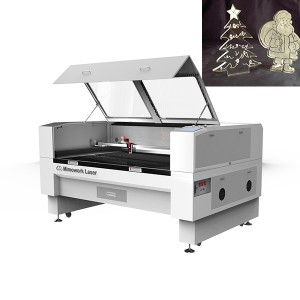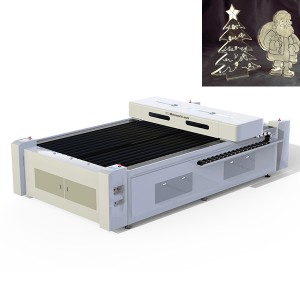How to set [Laser Engraving Acrylic] ?

Acrylic – Material Characteristics
Acrylic materials are cost-effective and have excellent laser absorption properties. They offer advantages such as waterproofing, moisture resistance, UV resistance, corrosion resistance, and high light transmittance. As a result, acrylic is widely used in various fields, including advertising gifts, lighting fixtures, home decoration, and medical devices.
Why Laser Engraving Acrylic?
Most people typically choose transparent acrylic for laser engraving, which is determined by the optical characteristics of the material. Transparent acrylic is commonly engraved using a carbon dioxide (CO2) laser. The wavelength of a CO2 laser falls within the range of 9.2-10.8 μm, and it is also referred to as a molecular laser.
Laser Engraving Differences for Two Types of Acrylic
In order to use laser engraving on acrylic materials, it is important to understand the general classification of the material. Acrylic is a term that refers to thermoplastic materials manufactured by various brands. Acrylic sheets are broadly categorized into two types: cast sheets and extruded sheets.
▶ Cast Acrylic Sheets
Advantages of cast acrylic sheets:
1. Excellent rigidity: Cast acrylic sheets have the ability to resist elastic deformation when subjected to external forces.
2. Superior chemical resistance.
3. Wide range of product specifications.
4. High transparency.
5. Unparalleled flexibility in terms of color and surface texture.
Disadvantages of cast acrylic sheets:
1. Due to the casting process, there may be significant thickness variations in the sheets (e.g., a 20mm thick sheet may actually be 18mm thick).
2. The casting production process requires a large amount of water for cooling, which can result in industrial wastewater and environmental pollution.
3. The dimensions of the entire sheet are fixed, limiting flexibility in producing sheets of different sizes and potentially leading to waste material, thereby increasing the unit cost of the product.
▶ Acrylic Extruded Sheets
Advantages of acrylic extruded sheets:
1. Small thickness tolerance.
2. Suitable for single variety and large-scale production.
3. Adjustable sheet length, allowing for the production of long-sized sheets.
4. Easy to bend and thermoform. When processing larger-sized sheets, it is beneficial for fast plastic vacuum forming.
5. Large-scale production can reduce manufacturing costs and provide significant advantages in terms of size specifications.
Disadvantages of acrylic extruded sheets:
1. Extruded sheets have lower molecular weight, resulting in slightly weaker mechanical properties.
2. Due to the automated production process of extruded sheets, it is less convenient to adjust colors, which imposes certain limitations on product colors.
How to Choose Suitable Acrylic Laser Cutter & Engraver?
Laser engraving on acrylic achieves the best results at low power and high speed. If your acrylic material has a coating or other additives, increase the power by 10% while maintaining the speed used on uncoated acrylic. This provides the laser with more energy to cut through the paint.
A laser engraving machine rated at 60W can cut acrylic up to 8-10mm thick. A machine rated at 80W can cut acrylic up to 8-15mm thick.
Different types of acrylic materials require specific laser frequency settings. For cast acrylic, high-frequency engraving in the range of 10,000-20,000Hz is recommended. For extruded acrylic, lower frequencies in the range of 2,000-5,000Hz may be preferable. Lower frequencies result in lower pulse rates, allowing for increased pulse energy or reduced continuous energy in the acrylic. This leads to less bubbling, reduced flame, and slower cutting speeds.
Video | High Power Laser Cutter for 20mm Thick Acrylic
Any questions about how to laser cut acrylic sheet
What about MimoWork’s control system for Acrylic Laser Cutting
✦ Integrated XY-axis stepper motor driver for motion control
✦ Supports up to 3 motor outputs and 1 adjustable digital/analog laser output
✦ Supports up to 4 OC gate outputs (300mA current) for directly driving 5V/24V relays
✦ Suitable for laser engraving/cutting applications
✦ Mainly used for laser cutting and engraving of non-metallic materials such as fabrics, leather goods, wooden products, paper, acrylic, organic glass, rubber, plastics, and mobile phone accessories.
Video | Laser Cut Oversized Acrylic Signage
Large Size Acrylic Sheet Laser Cutter
|
Working Area (W * L) |
1300mm * 2500mm (51” * 98.4”) |
|
Software |
Offline Software |
|
Laser Power |
150W/300W/500W |
|
Laser Source |
CO2 Glass Laser Tube |
|
Mechanical Control System |
Ball Screw & Servo Motor Drive |
|
Working Table |
Knife Blade or Honeycomb Working Table |
|
Max Speed |
1~600mm/s |
|
Acceleration Speed |
1000~3000mm/s2 |
|
Position Accuracy |
≤±0.05mm |
|
Machine Size |
3800 * 1960 * 1210mm |
|
Operating Voltage |
AC110-220V±10%,50-60HZ |
|
Cooling Mode |
Water Cooling and Protection System |
|
Working Environment |
Temperature:0—45℃ Humidity:5%—95% |
|
Package Size |
3850 * 2050 *1270mm |
|
Weight |
1000kg |
Recommended Acrylic Laser Engraver (Cutter)
Common Materials of laser cutting
Post time: May-19-2023




